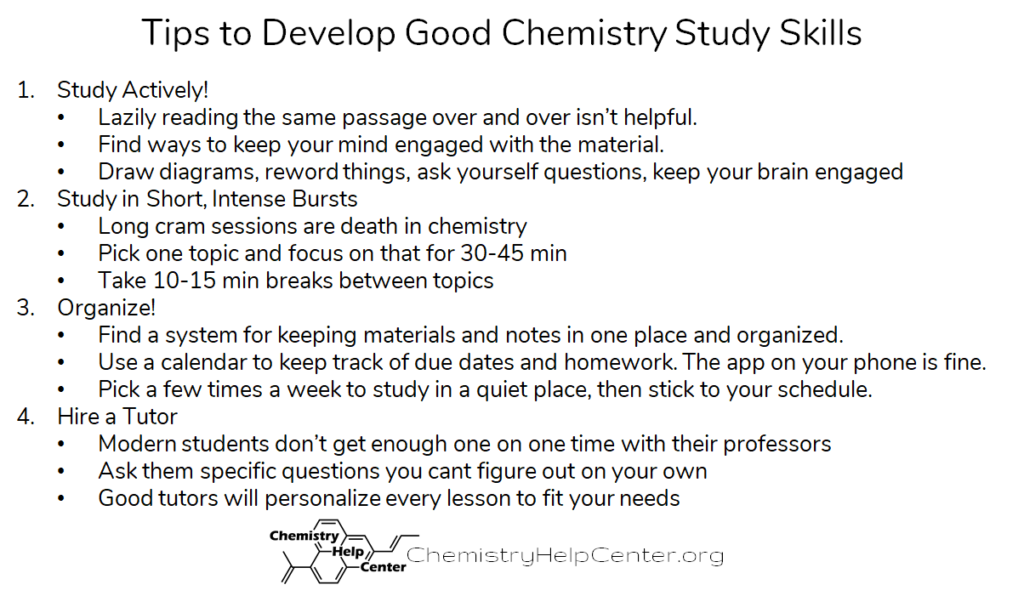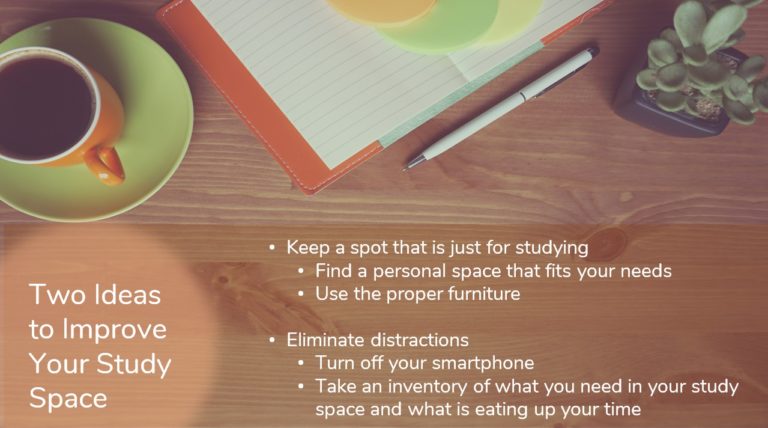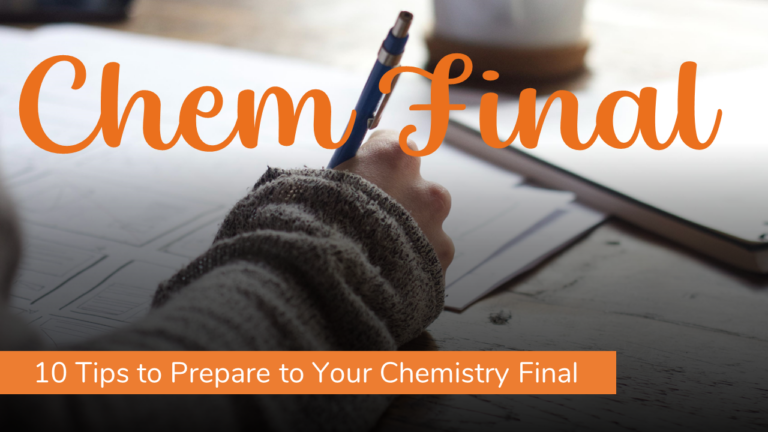How to Develop Good Chemistry Study Skills
It’s hard to tell from the outside how effectively a student is spending their time studying chemistry. The trouble is—that it’s easy to go through the motions of coming to class, reading assigned text, and doing homework without ever thinking deeply about why you are doing those things. It’s important to remember that if you are not engaged with the material while studying chemistry, you are wasting your time.
It certainly feels like studying when you go to class and take your notes. You read the book, you spent hours in front of a desk with all the right materials in front of you…But then why can’t you remember any of it for the test? I have listed below some of my favorite tips and habits that help you study chemistry more efficiently and get the grade you deserve.
Study in short, intense bursts
Chemistry teachers often say that for every hour in lecture you need to spend two hours studying chemistry on your own. So, for an organic chemistry class that meets three times a week, you’re looking at about 9 hours a week studying chemistry on your own. However, it is the quality of your chemistry studying that counts, not mere hours.
Avoid cramming! As humans, we cannot sustain focus for more than an hour. And if you force yourself into long study sessions, it will cause your brain to fatigue and you will end up wasting your time. Also, keep track of how much time you’re spending checking Facebook, halfheartedly going over your notes, and generally being unproductive, especially if it is a topic you already find a little boring. Those minutes add up quickly! It is better to keep study sessions short and intense. Break off an achievable amount of work, eliminate distractions from your study area, and attack your material for 30-45 minutes. This is the realistic amount of time that you can expect to stay mentally engaged on a single topic. Add more time to your study session and the brain zones out and muscle memory takes over.
When you are finished, reward yourself with a short break. Make sure to get up and move around a little bit, and maybe have a snack if you need a boost. When you return to studying choose a different topic to work on. This will help dealing with mental fatigue and ensure that your study time is maximally productive. After a few hours have passed, come back to the original topic and do a short review of everything you have studied. You will quickly figure out the material you feel comfortable with, and what you still need to work on. We’ve put together a quick guide on how to use the “Module System” when studying chemistry, so make sure to check it out.
Organize!
I often talk to first and second year chemistry majors who are overwhelmed by the amount of time that they are expected to study for each of their classes. They will tell me that they don’t have enough time to finish all their assignments, or that they don’t even know where to start. If you don’t have time, you don’t have your priorities set! The good news is that a little bit of planning can go a long way. You’ll finish projects on time and reduce the anxiety from never being able to catch up with your course load if you prioritize your tasks.
If you are not already using a calendar to manage your schedule then you should get one immediately. The calendar app on your phone works fine, there are plenty of other options. Here at Chemistry Help Center we use the Google Calendar for all our scheduling and organizing purposes. Pick the one that works best for you and use it every day. The art of keeping a personal schedule deserves its own article, but make sure that you set aside enough time to study every week (yes, schedule your study time!), and have an easy way of checking to see when important assignments are due.
By simply listing and organizing all your assignments into a schedule will make them seem much more approachable and help you to prioritize how you spend your study time. If you are still having trouble finding a place to start, remember to give yourself more time for bigger projects and try to get the assignments that you want to do least out of the way early in the week.
Find a tutor
The final thing that you can do to improve the effectiveness of your study time is to find a good tutor. Class sizes are larger than they ever have been! At a medium size school a general chemistry class can have 100-400 students and a large school can go up to 800 students in a single class! This reduces one on one time with the professors to almost zero. For most students, a few hours of lecture in a crowded classroom every week isn’t enough instruction to really grasp chemistry concepts.
Hiring a tutor will ensure that you have one on one time with an experienced professional every week. This is a chance for you to ask questions and have difficult material explained at your pace and in a way that suits your learning style. Good tutors will take the time to get to know you and personalize every lesson to fit your needs. Tutors will also help you to organize your knowledge and connect material from other classes to help you understand the bigger picture. If you are trying to catch up with the material or are looking for that boost that will really help you stand out, spending even one hour with a tutor a week can drastically improve material retention, performance, and confidence.
In summary







